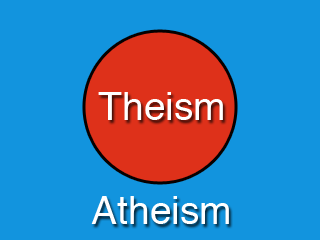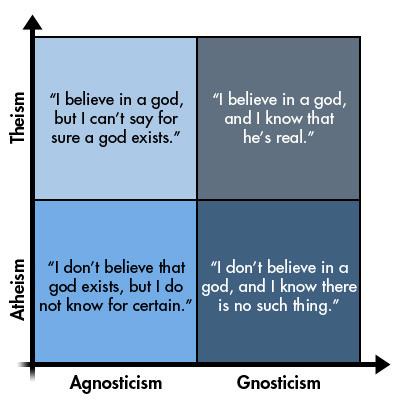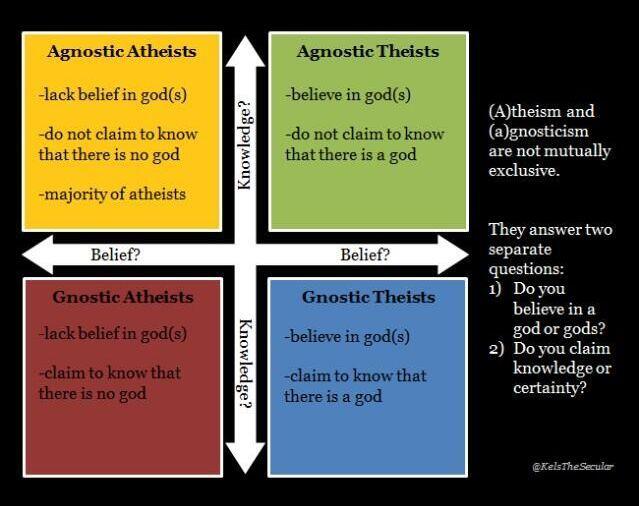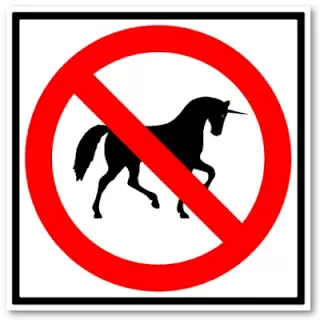Atheist vs Agnostic: Do they conflict?
I often run into folks who ask me why I don't claim to be an agnostic instead of an atheist. The more aggressive of these folks will actually accuse me of being illogical for claiming to be an atheist and they assert that agnosticism is the logical conclusion. This confusion is based on a misunderstanding of the concepts involved, so I figured I would write out an explanation here to make it understandable.
Theism and atheism are about belief. Gnosticism and Agnosticism are about knowledge.
 Theism is a positive statement of a belief in God. If you are convinced a God exists, then you accept the proposition put forward by Theism. If you remain unconvinced and do not accept the statement "there is a God", then you are an atheist. Everything other than "Yes, I believe there is a God" is atheist. There is no middle ground between atheism and theism. It is an if-else statement, like the Venn Diagram to the side. You either believe or you don't. If you want to say, "I don't know", that's fine but it means you haven't accepted the Theist assertion and are therefore a-theist (it's also not really an appropriate answer to the question about belief, as we'll see below).
Theism is a positive statement of a belief in God. If you are convinced a God exists, then you accept the proposition put forward by Theism. If you remain unconvinced and do not accept the statement "there is a God", then you are an atheist. Everything other than "Yes, I believe there is a God" is atheist. There is no middle ground between atheism and theism. It is an if-else statement, like the Venn Diagram to the side. You either believe or you don't. If you want to say, "I don't know", that's fine but it means you haven't accepted the Theist assertion and are therefore a-theist (it's also not really an appropriate answer to the question about belief, as we'll see below).
Do not get confused though: Being an atheist doesn't mean you are positively asserting "there is no God" it simply means you have not accepted the position of Theism. I lack the Theist belief in God. It's the difference between saying "I do not have a belief in God" vs "I have a belief that No God exists". The first is an absence of belief and the second is a positive belief in the absense of something. To positively state "there is no God" is more like anti-Theist which is not my stance in general. (However, you may actually hear me say something similar to "there is no God" or "God doesn't exist" but in those instances, I'm just being brief in my wording because I don't want to get into the technical wording. More on this below.)
Let's start with a basic example that I heard from Matt Dillahunty:
 This jar has some gumballs in it. It's safe to say that there is either an even number of gumballs in it or an odd number of gumballs in it. Bob says, "I believe there is an even number of gumballs." Bob is an Even-ist. If I'm asked, "Are you an Even-ist?" I would have to say, "No, I haven't seen any evidence to support your claim there is an even number of gumballs in the jar." If someone were to then ask, "Ah, so you think there is an odd number of gumballs then?" I would have to say, "No, I'm not saying that either. I'm just saying I haven't seen any evidence to support Bob's Even-ist belief."
This jar has some gumballs in it. It's safe to say that there is either an even number of gumballs in it or an odd number of gumballs in it. Bob says, "I believe there is an even number of gumballs." Bob is an Even-ist. If I'm asked, "Are you an Even-ist?" I would have to say, "No, I haven't seen any evidence to support your claim there is an even number of gumballs in the jar." If someone were to then ask, "Ah, so you think there is an odd number of gumballs then?" I would have to say, "No, I'm not saying that either. I'm just saying I haven't seen any evidence to support Bob's Even-ist belief."
Gnosticism and Agnosticism are about knowledge (although there is an alternate usage of "Gnosticism" which refers to a specific ancient religion which was related to early Christianity). If a person is agnostic about a claim, they believe the truth is either unknown or unknowable. So, I am agnostic as to the even-vs-odd question about the gumballs because I do not know if the count is even and I do not know if the count is odd.
In this fashion, I am both an atheist and and agnostic because while I do not believe in any gods, I cannot know for sure that no gods exist.
Combing these non-mutually-exclusive terms presents us with four possible combinations:
 |  |
Do you believe in God? No? Then you're an atheist. Are you 100% certain? No? Then you're also agnostic.
Beyond the technical definitions of atheism and agnosticism, I simply refer to myself as an atheist and ignore the agnostic part of my stance because people often misunderstand it. Noah Lugeons, the Scathing Atheist, describes our shared stance quite amusingly:
I'm not willing to say with absolute gnostic certainty that I'm not going to get raped by Bigfoot tonight, so maybe in a technical sort of way I'm agnostic about it, but I'm certainly not going to live my life with Non-Consenual Sasquatch Sodomy as even the remotest of concerns. So, does that make me a Bigfoot Rape Agnostic or a Bigfoot Rape Atheist? And when the chips are down, is there any difference?
Very often people take "agnostic" to mean that I consider both positions to be equally likely. As if I considered it 50% likely for theism to be correct and 50% likely for theism to be wrong, which is not at all my stance. I'm 99.99% sure that no gods exist, but I simply can't be absolutely 100% sure because it's not possible to experiment and produce a 100% certainty of that negative assertion. However, I'm just as certain that no gods exist as you are certain that no unicorns exist. (cue the flood of comments of people rushing to defend unicorns) I've never seen any evidence for the existence of unicorns, but we haven't been able to look everywhere in the universe at all once, so I can't postively assert that unicorns absolutely do not exist. However, the time to start believing in unicorns is when we have evidence of unicorns and not until then. The same goes for fairies and Santa and God and lizard-people infiltrating the government and alien abductions and demons and ghosts and Bigfoot and homeopathy and...

